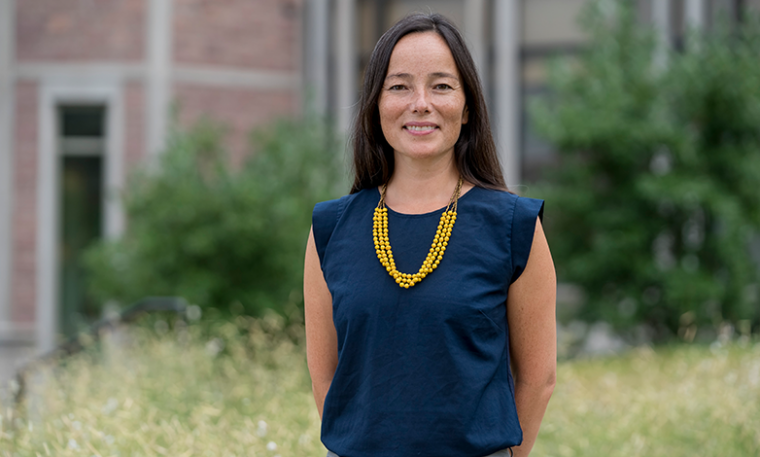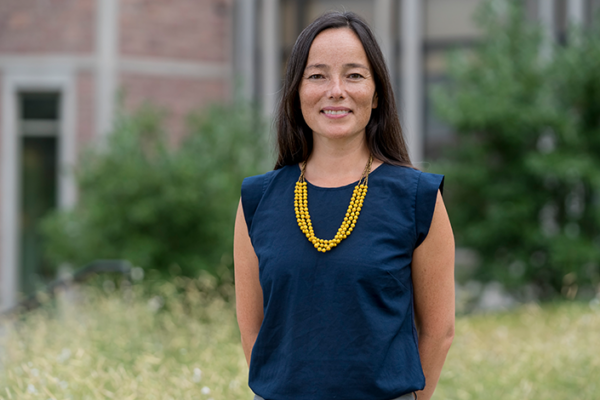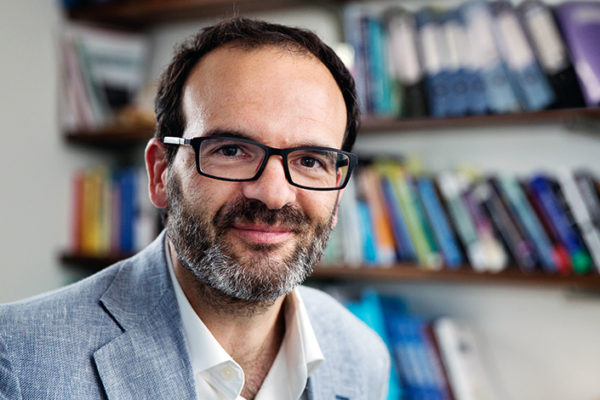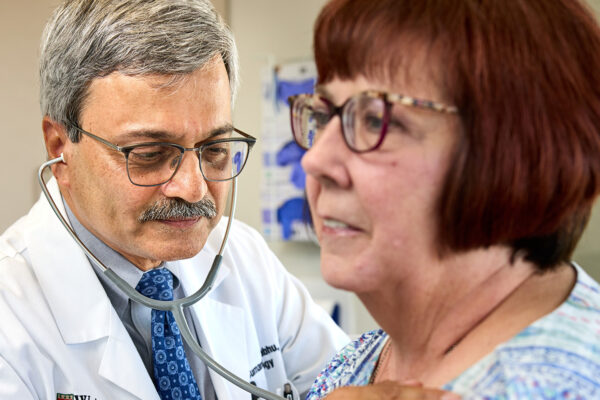Kim Thuy Seelinger first became interested in the sobering field of gender-based violence in armed conflict while attending law school. She had just begun her final year at New York University when the Sept. 11, 2001, terror attacks took place.
She had planned to work in international human rights, but in the wake of Sept. 11, her city faced questions about balancing national security with immigrants’ rights. Seelinger was enrolled in an immigration clinic that year, and the experience convinced her to switch tracks and practice deportation defense.
Her first few years of legal practice involved representing survivors of domestic violence and conflict-related sexual violence. “All the research and policy work I do now is still informed by what my clients shared with me,” she said. “I think of them every day.”
Today, Seelinger is a research associate professor at the Brown School, visiting professor at the School of Law, and director of the Center for Human Rights, Gender and Migration at the Institute for Public Health, all at Washington University in St. Louis.
Seelinger’s research on prosecution of conflict-related sexual violence and survivor-centered legal processes has made her a sought-after expert to work with judges, prosecutors and victims’ counsel around the world. She spent over a decade traveling across Africa — Liberia, Senegal, Nigeria, Central African Republic, Democratic Republic of Congo, Uganda and Kenya — supporting lawyers who often were working on their first war crimes cases.
More recently, Seelinger has spent time in Ukraine. In March 2023, she was invited to a meeting convened by Ukrainian President Volodymyr Zelenskyy. She then returned multiple times to support and train Ukraininan prosecutors focused on investigating wartime rape by Russian soldiers in occupied areas of the country. Seelinger also was recently nominated to the Organization for Security and Cooperation in Europe’s Moscow Mechanism panel of human rights experts. She was confirmed in July, along with five other delegates including Leila Sadat, the James Carr Professor of International Criminal Law at WashU.
From 2021-23, Seelinger served as special adviser on sexual violence in conflict to the International Criminal Court prosecutor in the Hague. Now, at prosecutor Karim A.A. Khan’s request, Seelinger has taken academic leave from Washington University to serve as the Office of the Prosecutor’s first senior coordinator for gender-based crimes and crimes against children.
Law and social work don’t always go together. How did you get into those fields?
“Law and social work are a necessary pairing. They need each other. I’m grateful for the opportunity to combine both disciplines, and it’s part of what attracted me here (from the University of California, Berkeley School of Law) in 2019.
“I was really hungry at Berkeley to do more interdisciplinary work, and WashU is very willing to make that happen. There is so much great international work happening at the law school, and there are also so many colleagues at the Brown School doing incredible global work around systems of protection, institutional responses and survivor experiences.
“I’m a lawyer in practice, and that’s really where my disciplinary home has been for more than 20 years. But this combination of law and social policy felt really right to me. I can do my research with the Brown School, teaching at the School of Law and policy work as director of the new Center on Human Rights, Gender, Migration. I get to mix it all together and support other people doing the work.”

You’ve spent much of your career focusing on gender-based violence in areas like Central America, the Mediterranean and Africa. How have you applied that knowledge to what’s happening in Ukraine?
“My work is generally split between accountability for wartime gender-based violence and protection from gender-based violence in the context of forced displacement. So I spend a lot of time in courts, on one hand, and refugee camps, on the other.
“When the conflict in Ukraine broke out, Pramila Patten, the U.N. special representative on sexual violence and conflict, asked for assistance in dealing with what was a new and scary situation.
“The Ukranians wanted to take this very seriously. They needed support, training and ways to rebuild trust and confidence among survivors and communities. So, she asked me to come and help with analysis, but also in thinking about ways to reform some of their current laws.
“I went back to Kyiv to work more closely with the prosecutors. It was moving, to see them trying to pull these cases together while still in the middle of a war — they work with air raid sirens going off all day. They themselves have been displaced. Or they have sent their children to Poland for safety. We forget, sometimes, how entire justice systems are still made up of people putting one foot in front of the other every day. And how much harder that is during active conflict.”
What other projects have you been working on recently?
“Obviously, there was a lot of work to do in Ukraine. I was fortunate to be able to involve a number of law students in what I was doing there this spring. They looked into law reform questions our Ukrainian colleagues are struggling with. Another group of students in the same class last semester worked with a coalition of human rights defenders in Belarus, to do a gender analysis of political repression there.
“We also worked on Ethiopia. There has been a terribly brutal conflict there these past few years that somehow the world completely ignored. We conducted a study last year and released a report, “Understanding Conflict Related Sexual Violence in Ethiopia.” That study was commissioned by the U.K. government, but our own State Department has been quite interested in our findings. I took a few students to Washington, D.C., with me to present it to members of Congress and colleagues at the State Department.
“And I’m still working with a longtime colleague, Denis Mukwege, who is an OB-GYN and Nobel Peace Prize laureate in the Democratic Republic of Congo. He runs a hospital in the eastern part of the country that I have visited many times. Survivors there need psycho-social support and medical care of course. But they also need socio-economic re-integration and access to legal aid.”
You’re in a line of work where bad things keep happening in the world. Can you see progress being made?
“Sometimes I wonder if we’ll ever see the end of the brutality, the impunity, the displacement. But I do think we are seeing some progress.
“For one thing, we have much more global guidance on how to prevent and respond to conflict-related sexual violence these days. There’s been so much good, recent thinking about how to do this work safely, ethically and effectively. For example, the Murad Code is a great resource that can guide those conducting documentation or interviews. There are also excellent resources from the humanitarian sector, which help raise awareness about gender-based violence in the context of refugee crises around the world.
“I’m lucky to have been invited to draft a few of the key documents, actually. For example, in 2022, U.N. Special Representative Pramila Patten invited me to conceptualize and draft the UN Framework for the Prevention of Conflict-related Sexual Violence. The framework is ultimately a political document aimed at UN member states, but I combined legal research and public health concepts to ground it and give it shape.
“Now, at the International Criminal Court Office of the Prosecutor, I have just led a year-long review and rewrite of two major documents: the Policy on Gender-based Crimes and the Policy on Children. Adriana Aramburu Graypel, manager of the Center for Human Rights, Gender and Migration, and law alumnus Max Karakul, my former student and current intern at the ICC, helped out with the review process this year. This work is where my Brown School and law school worlds meet, literally.
“The other bright spot is probably more important: There has been a shift in the past few years to follow the lead of survivors of conflict-related sexual violence. They went from being stigmatized, invisible and silent to emerging as vocal participants in the conversation. Now, at most legitimate meetings on these issues, leaders from survivor communities step up and share their experiences and views; they tell us very clearly what they think about a legal system or what they hope to get out of a process. This goes for research, too. Our university institutional review board committees often assume that all survivors of atrocity crimes — especially sexual and gender-based violence — are too vulnerable to be engaged in research projects.
“The truth is, some want to participate. Some even want to do the research with us. And they can. Survivors can help formulate research agendas, choose the best methods to use, and determine what kind of impact a study should aim to have. I really believe it’s time to move from researching survivors to researching with them. They can tell us what the literature is missing.”



